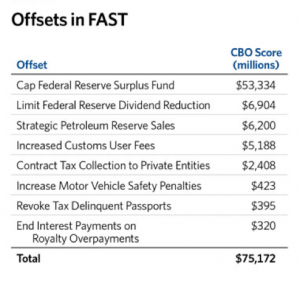A contribution by Chanil N. De Silva; Director of Policy at Nouveau Inc.
President Obama signed a five-year, $305 billion, surface-transportation funding bill into law on Friday December 4th. The bill, known as the FAST Act (Fixing America’s Surface Transportation Act) is the first long-term transportation-funding bill since 2005.
The bill, which was a compromise between the Senate DRIVE Act and the House STRR Act passed conference on December 1st, just days before the two-week funding patch enacted by President Obama expired.
Key Senators and Members:
As Chairs and Ranking Members of their respective Chambers’ committees of jurisdiction, the conference committee was led by Bill Shuster (R-PA), who acted as Chairman of the conference committee, and serves as Chairman of the House Committee on Transportation and Infrastructure, Jim Inhofe (R-OK), who acted as Vice Chair of the conference committee, and serves as the Chairman of the Senate Environment and Public Works Committee, Barbara Boxer (D-CA), who serves as Ranking Member of the Senate Environment and Public Works Committee, and Peter DeFazio (D-OR), the Ranking Member on the House Transportation and Infrastructure Committee.
Funding Level and Pay Fors:
The measure calls for $305 billion in total spending, including $205 billion on highways and $48 billion on transit projects. Spending authorized by the FAST Act far exceeded revenue projections to the Highway Trust Fund, forcing Congress to find alternative mechanisms to make up for the shortfall. The funding gap was covered by a transfer of $75 billion from the General Fund and $300 million from the Leaking Underground Storage Tank Trust Fund, which is incidentally also funded by the gas tax. These transfers are offset by a number of unrelated provisions provided in Table I below:
Key Infrastructure Provisions
• Establishes a new competitive grant program, the Nationally Significant Freight and Highway Projects (NSFHP) program to emphasize the need to address large-scale projects of national or regional importance.
• Modifies the National Highway Freight Network created by the Moving Ahead for Progress in the 21st Century Act (MAP-21), and requires the re-designation of the Network every five years to reflect changes in freight flows, including emerging freight corridors and critical commerce corridors.
• Converts the Surface Transportation Program (STP) to a block grant program, maximizing the flexibility of STP for states and local governments.
• Increases the amount of STP funding distributed to local governments from 50 percent to 55 percent over the life of the bill.
• Expands eligibility for the Transportation Infrastructure Finance and Innovation Act (TIFIA) program by allowing states to use the National Highway Performance Program, STP block grant, and NSFHP funds to pay the subsidy and administrative costs associated with providing TIFIA credit assistance.
• Provides an $8 billion funding boost for Amtrak to initiate a state-of-good-repair program, a competitive rail safety and infrastructure grant program, and a program to provide operating assistance to passenger rail providers to initiate or restore rail services.
• Provides for the deployment of transportation technologies and congestion management tools that support an efficient and safe surface transportation system and encourages the installation of vehicle-to-infrastructure equipment to reduce congestion and improve safety.
• Streamlines the environmental review and permitting process to accelerate project approvals by reforming environmental reviews for historic properties and establishing a new pilot program to allow up to five states to substitute their own environmental laws and regulations for the National Environmental Policy Act (NEPA).
Criticisms of the bill
• Creates a number of new projects and processes aimed at addressing infrastructure issues but fails to address the underlying problems in the trust fund, which is a massive misalignment between fuel excise tax revenues and spending obligations.
• According to the Congressional Budget Office if not reformed, the Highway Trust Fund will exhaust its reserves by 2021, requiring $100 billion to keep it solvent through 2025.
• Fails to provide the level of investment needed to restore or replace aging transportation infrastructure.
• Permits the sale of 66 million barrels of crude oil from America’s strategic petroleum reserves at $94 per barrel. However, currently oil prices are $40 per barrel. The bill not only overestimates the value of the sake but also takes away from a source of national energy security.
